Care Centre
Care Centre
CARE
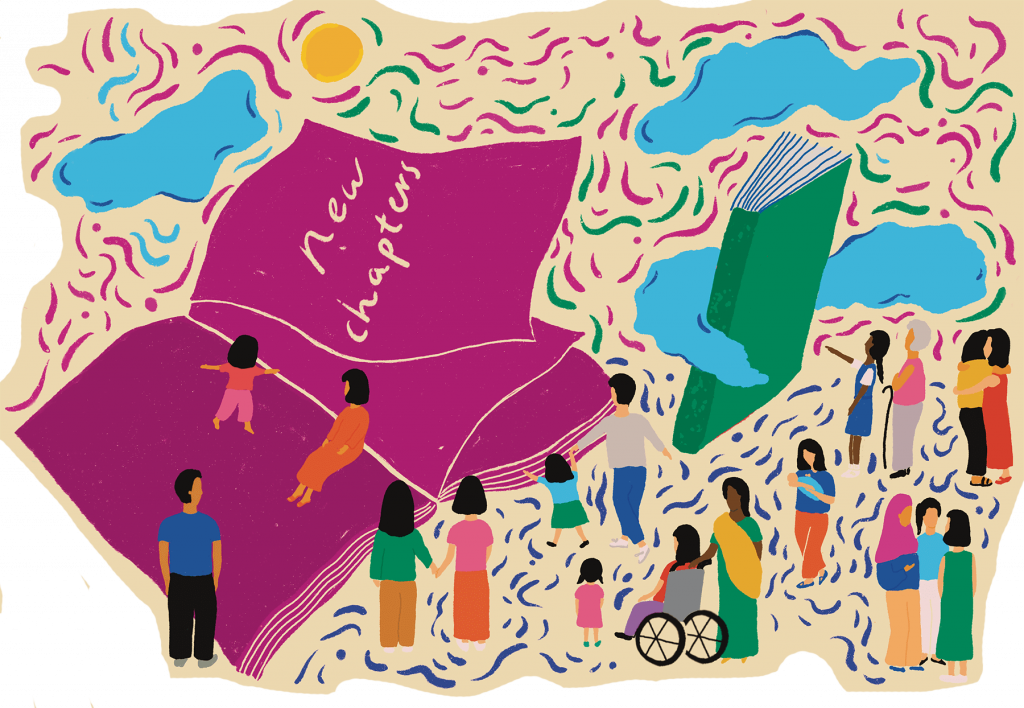
CARE Overview
AWARE’s CARE department comprises the Women’s Care Centre (WCC) and the Sexual Assault Care Centre (SACC). CARE is committed to building safe spaces and enabling informed decision-making for individuals facing gender-based discrimination, violence and other forms of distress. We work closely with external partners in the social service sector in Singapore, and advocate for gender- and trauma-informed practices among key stakeholders.
In 2022, CARE cumulatively supported a total of 3,876 clients across all services, averaging 75 clients per week.
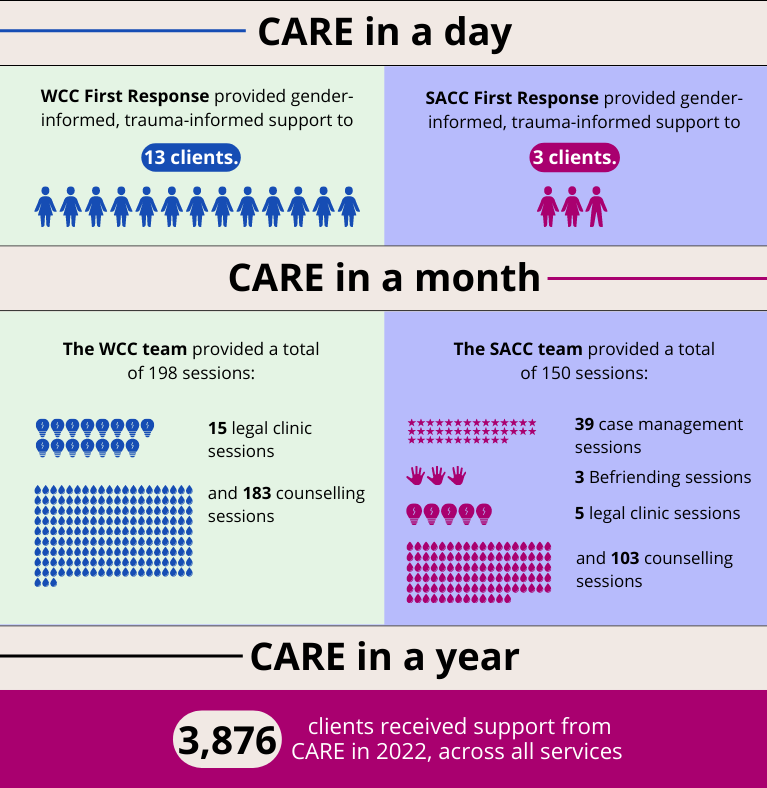
CARE’s Volunteers
CARE is dedicated to fostering collaboration among people and professionals from different walks of life to support individuals in distress. In 2022, we were able to mobilise the expertise and commitment of 61 highly skilled volunteers (Helpliners and lawyers), who generously contributed 4,122 hours of support to women and other survivors of violence. Collectively, this represented 515 days of volunteer work, strengthening our community and contributing to a society that looks out for its members.
Our volunteers come from diverse backgrounds, from social work, psychology and medicine, to public administration, law, computer science and business administration.
We invest time and resources into onboarding and training our volunteers to align service provision with AWARE’s values and principles. For example, in March 2022, we successfully trained and empowered 16 women to become First Responders on our Women’s Helpline. Training included a compulsory, biweekly, two-month “classroom” training programme on topics such as self-awareness and values, family violence, family law, mental health, first response for survivors of sexual violence and trauma-informed first response. This training was made possible by AWARE colleagues from different departments, and also AWARE’s partners from academia, social work, counselling and the legal profession.
CARE Team Restructuring
Trauma-Informed Programme
Having heard countless survivors of violence talk about poor help-seeking experiences at different institutions in Singapore, we realised the importance of implementing consistent trauma-informed institutional processes at AWARE, beyond just trauma-informed care. That is, not only would AWARE’s professionals and volunteers apply trauma-informed principles when working with clients, but the entire staff within the organisation would apply those principles when working together, in order to create an overall trauma-informed workplace.
To this end, AWARE staff across departments participated in three workshops organised by CARE, exploring how the organisation could think and act in a trauma-informed way. The key principles we committed to were safety, choice and transparency and trustworthiness. These principles will inform the way AWARE handles people-management, makes decisions and maintains a safe working environment for all moving forward.
Women’s Care Centre
I. WCC First Response
WCC’s First Response channels include the Women’s Helpline, email and our online chat service. It is the first point of contact for women reaching out for support. First Response is delivered by trained staff, consultants and volunteers from a range of professional backgrounds.
Since its inception in 1991, the Women’s Helpline has enabled a diverse group of women to provide non-judgemental, empowerment-focused assistance and information. Grounded in feminist principles, the Helpline treats callers as equals, seeing women as resourceful and capable even in the most difficult and challenging situations.
Thanks to the efforts of our 36 Helpline volunteers and four Helpline Executives, we were able to provide 4,467 hours of support on the Women’s Helpline throughout 2022.
The number of calls to the Helpline fell below the anomalous peaks seen during the 2020 and 2021 pandemic period, but remained higher than calls in 2019. With the addition of national resources launched during the pandemic, and the relaxation of COVID safety measures, individuals had a wider range of resources from which to seek help in 2022. In all, 2,981 individuals reached out to us through WCC’s various channels. While 76% of callers mainly reached out through the Women’s Helpline, the demand for chat service remained consistent at 220 (4.2% of overall calls). This indicated a need to maintain the chat service option for clients who might not have a safe place to speak about their issues.
2022 at a glance:
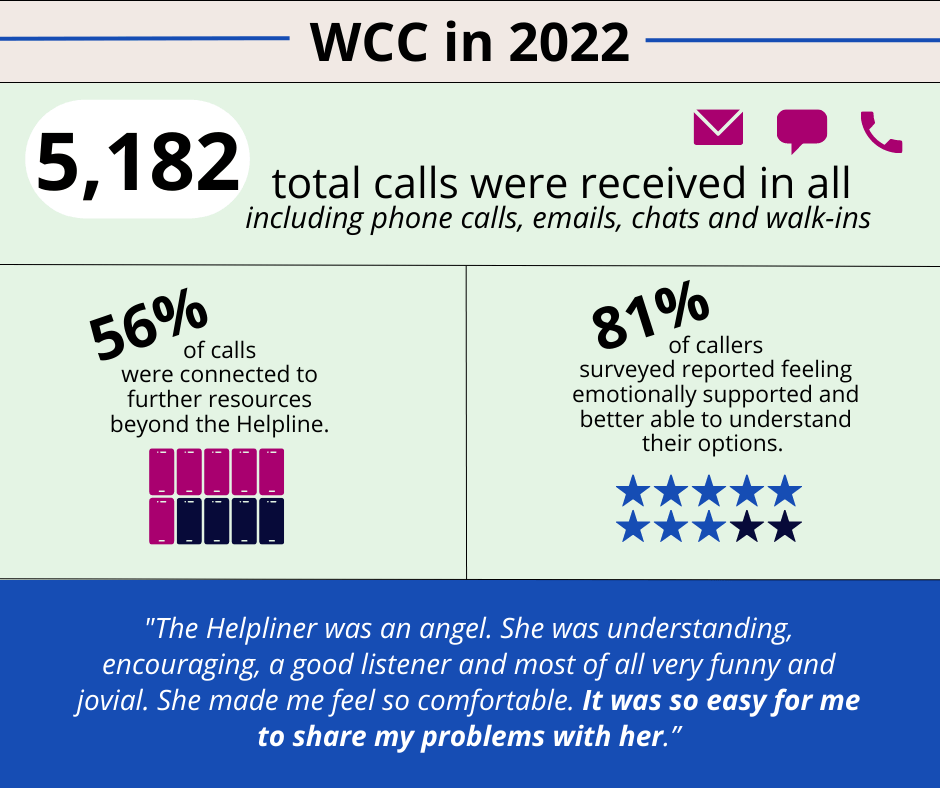
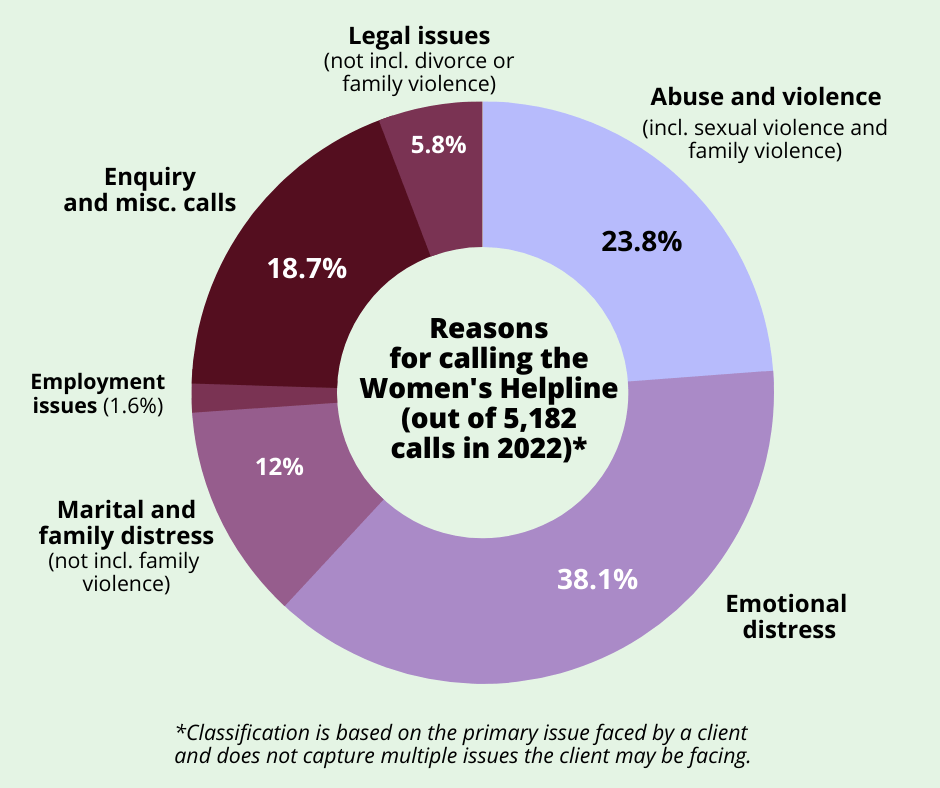
II. WCC Services
Our Helpliners encourage callers to identify their needs, and connect them to services, such as counselling and legal clinic, that can empower them in their journey. The latter direct service channel is our second stage of service provision for those who require further support, guidance and information.
WCC Counselling
WCC’s counselling service recognises that women are the experts of their own situations. Our counsellors provide non-judgemental support focused on increasing women’s safety and access to resources. We enable clients to recognise the options available to them, and to build and maintain a strong and positive sense of self.
In 2022, the counselling team’s main focus was stabilising its service after the movement of key counselling staff and the overall restructuring of CARE. There was also a decrease in counselling clients (by 18%) and sessions (by 22%) due to the drop in Helpline callers after COVID restrictions lifted. We conducted a monthly capacity-monitoring exercise to review the workload of counsellors following the demands of 2021. As such, we observed a reduction in burn-out rate, leading to better counsellor retention, increased ability to support new clients and better client-load management. We also successfully converted our team of long-serving volunteer counsellors into consultant positions.
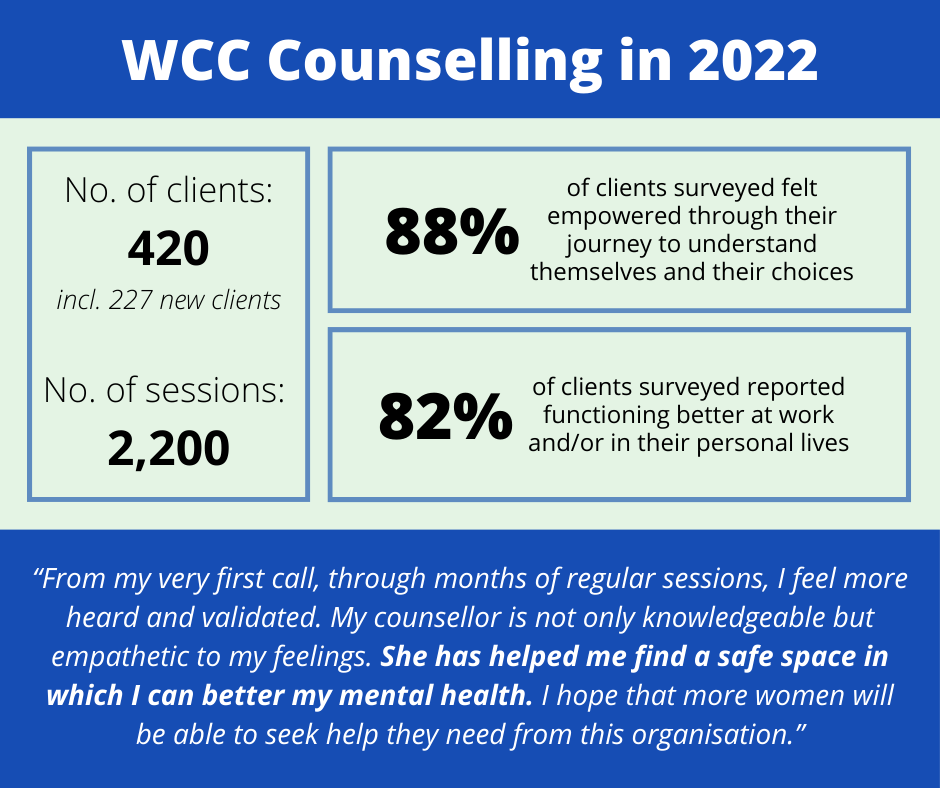
Our counsellors underwent individual supervision in addition to group supervision sessions, contributing to the quality and effectiveness of the service. We also provided practicum opportunities for intern counsellors, allowing exposure to client work and to AWARE’s gender-informed and trauma-informed service delivery. Lastly, we conducted inter-department sharings to update the counselling team about the full range of services within the AWARE ecosystem, and also invited external collaborators to improve our competence in niche sectors of client support.
With the relaxation of COVID restrictions, the counselling team was able to resume in-person sessions at the AWARE Centre’s re-furnished counselling rooms. These sessions were primarily offered to clients who faced limited safety and privacy in their homes.
WCC Legal Clinic
The WCC legal clinic provides free, 20-minute legal consultations to women on topics such as family and intimate partner violence, employment issues and marital issues including divorce, separation, maintenance and custody. In 2022, our legal clinic provided legal consultations via telephone and the team worked hard to mitigate any disruption to service, remaining operational throughout the pandemic.
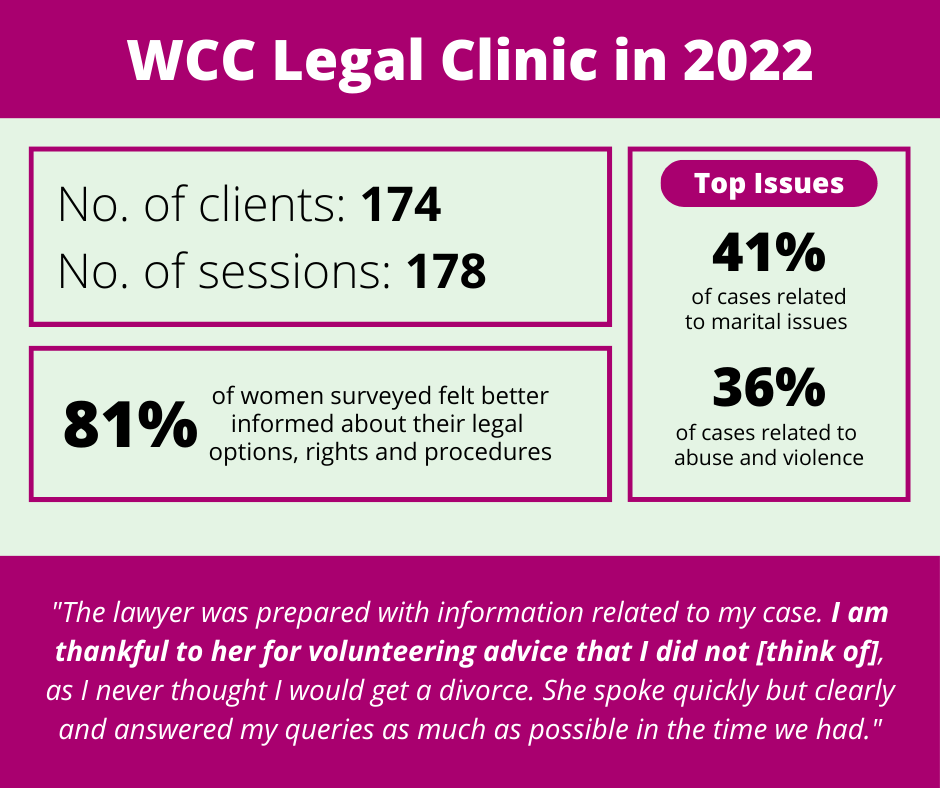
Sexual Assault Care Centre
SACC continued to provide gender-informed and trauma-informed services to survivors of sexual violence in 2022, supporting close to 1,000 cases. We saw a slight dip in the overall number of cases, possibly due to the lifting of COVID restrictions and increased access to other avenues of support around Singapore. At the same time, we saw a significant jump (around 47%) in existing clients returning and/or seeking continued support from previous years.
2022 was a landmark year for governmental support for survivors of sexual violence, with the addition of sexual harassment and sexual violence as supported categories under the National Anti-Violence and Sexual Harassment Helpline. We were heartened by the increase in public awareness of sexual violence, and efforts made by the community to respond to sexual violence sensitively—partly through the skills that many have gained at AWARE’s Sexual Assault First Responder Training.
Following the launch of our triaging service model in 2021, SACC refined the model, managing our capacity more effectively by directing the appropriate level of resources to each case. The SACC team was thus better able to manage our workload and commit to the well-being of team members. We enhanced our staff support structure with skills training, team huddles and supervision, making sure our team members had the resources and tools to provide quality support. In order to ensure knowledge consistency across our team, we set up an internal information resource for staff in SACC to benefit from their colleagues’ accumulated knowledge.
I. SACC Cases
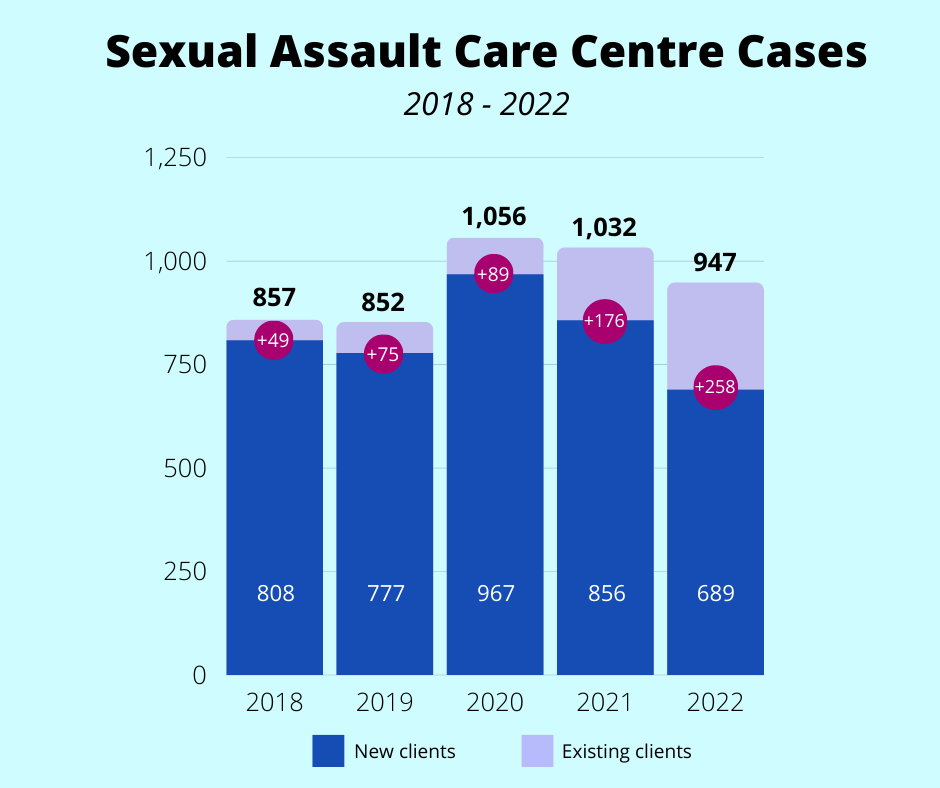
As part of our mission to provide trauma-informed care, we do not require survivors to identify perpetrators or give details about their experience as a condition for accessing services. Survivors have the choice to share or not share this information with us—while it may help us tailor support better, it is not always necessary.
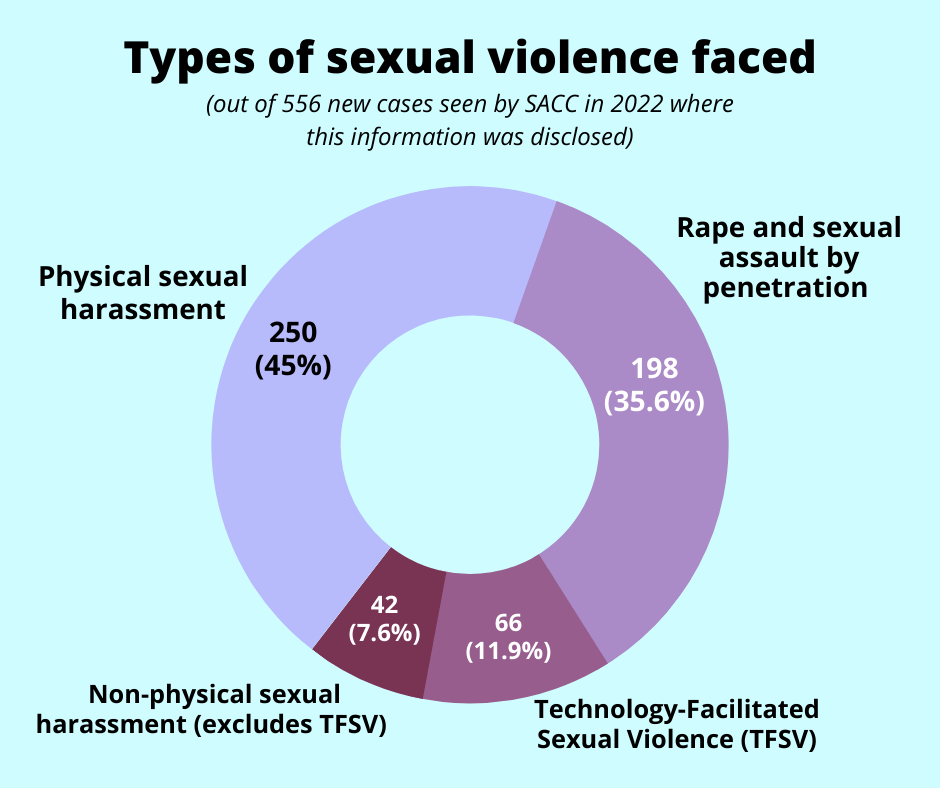
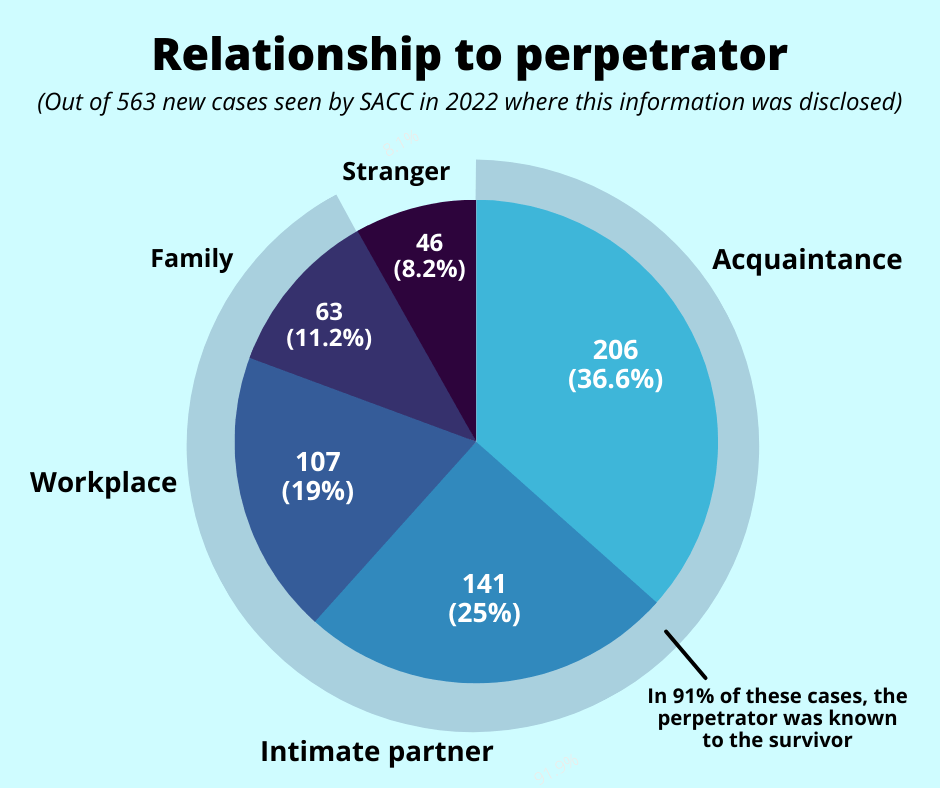
In 9 out of 10 cases where the information was disclosed to SACC, the perpetrator was known to the survivor. The narrative that sexual assault is caused by strangers is misleading and harmful, given that most sexual assaults were perpetrated by someone who was trusted by a survivor, and had access to them.
Further Observations
- The majority of survivors attended to by SACC in 2022 were cisgender women (89.3%). Cisgender male survivors (10%) and transgender/non-binary survivors (0.7%) formed a minority of survivors we saw.
- Of the cases where the incident date was disclosed to SACC, 50% of survivors reached out for help within five weeks of the incident.
- In about 25% of cases, another person reached out to SACC on behalf of the survivor.
- Fourteen per cent of all new cases involved childhood sexual assault, including adult clients seeking assistance for incidents that occurred in their childhoods. These survivors had various reasons for coming forward: Some sought SACC’s help after a recent trauma trigger, or after learning of the existence of avenues of support; others only recognised their experiences as abuse after receiving sex education.
II. SACC Services
SACC provides a range of services catered to the needs of sexual assault survivors. In 2022, the First Response team operated the SACC Helpline, WhatsApp service and email channels. Across these modes, our First Responders provided empathetic listening ears and created safe spaces for survivors to share their stories, many of them for the first time. We provided information and options such that survivors could make informed decisions about next steps.
Survivors also had a range of services to access based on their needs: They learnt about their legal rights and options through the SACC legal clinic, and were supported at the courts, police stations and hospitals by the SACC Befriending team; they received support and information for short-term coping and practical concerns through the SACC case management service, and embarked on long-term healing with SACC counsellors. Below we highlight the services provided by SACC in 2022 and their impact on the survivors who reached out to us.
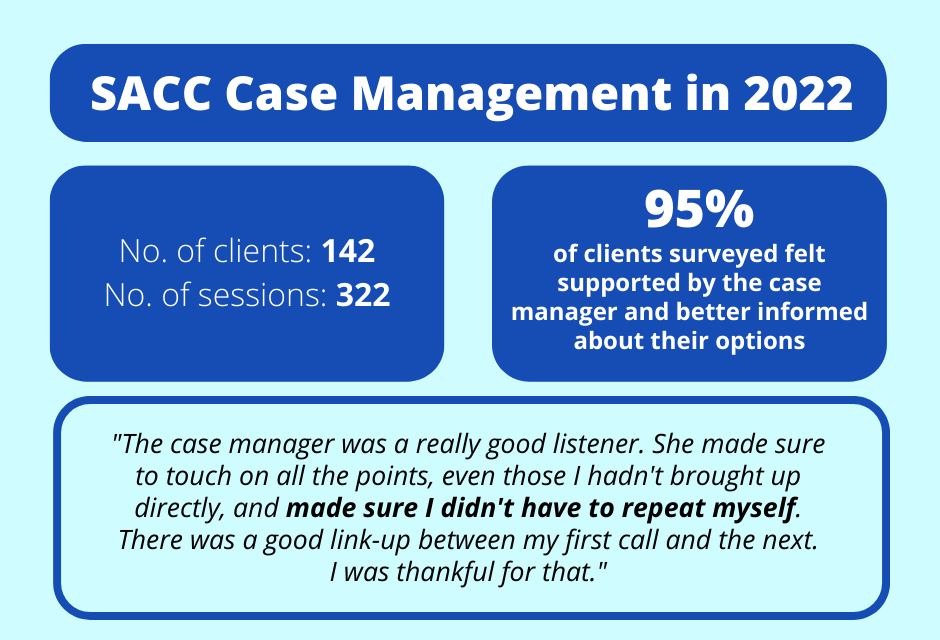
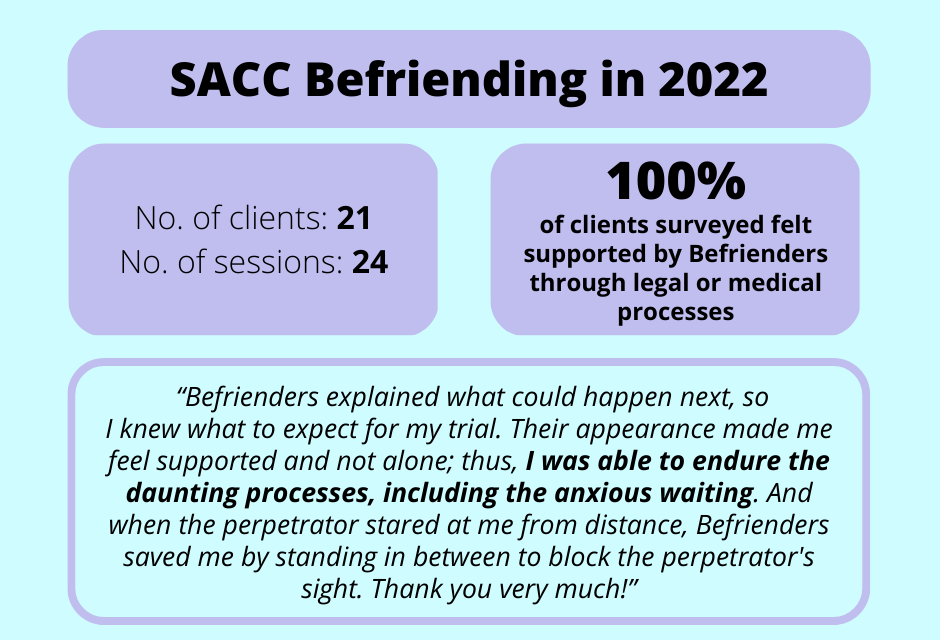
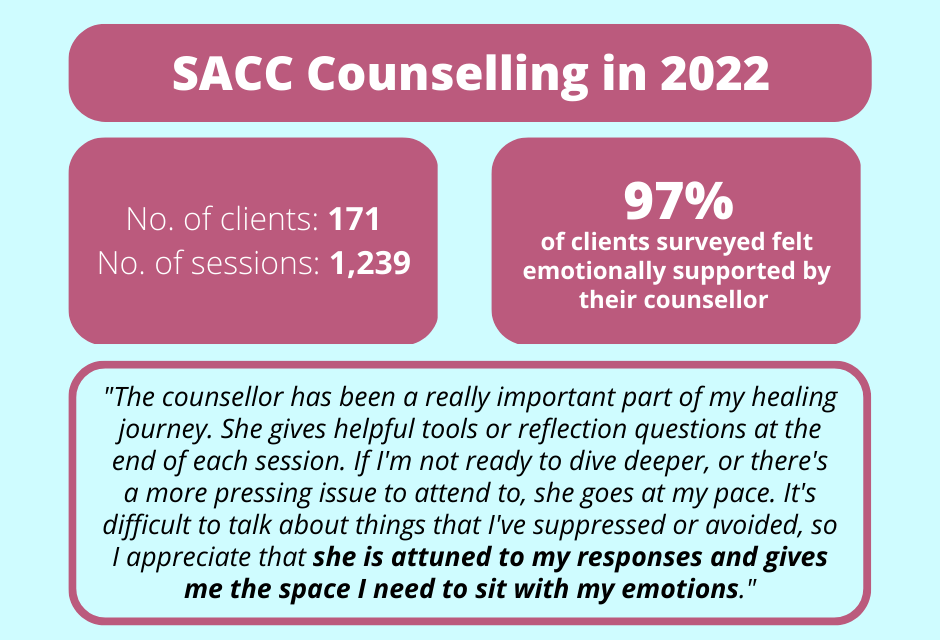
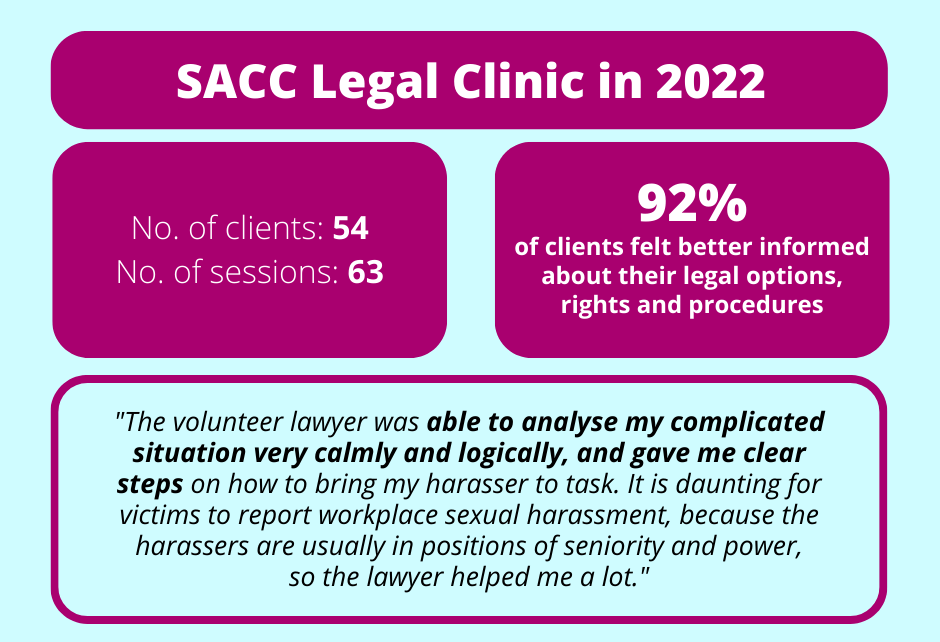
III. Community and Stakeholder Engagement
Improved Access to Trauma-Informed Justice and Support
Part of the continued mission of SACC is to advocate for greater access to justice and support from various systems with which survivors interact, such as the criminal justice system and the social service sector. In 2022 we continued SACC’s case advocacy work within the criminal justice system by working with the Attorney-General’s Chambers and Serious Sexual Crimes Branch.
A potential barrier to justice and support that we highlighted to various institutions was mandatory reporting in the Criminal Procedure Code. From SACC’s experience, mandatory reporting might hinder help-seeking behaviour among survivors and act as a barrier for professionals to effectively carry out their duty of care towards their clients. Survivors have told SACC that they chose not to approach other professional agencies for help because they did not wish to be made to file police reports. This might have delayed their healing journeys.
We also advocated for the social service sector to build up its capacity to work with a) diverse needs and b) vulnerable groups with intersecting identities, to increase survivors’ access to trauma-informed support.
Building the Ecosystem
In a bid to continue to improve survivors’ access to support in the social service sector, we ventured beyond knowledge-exchange sessions with individual social service agencies in 2022, piloting AWARE’s Sexual Assault Caseworker Training (SACT) for 16 professionals from five sectors (family services, family violence, medical, mental health and education). We decided to launch this training in recognition of the fact that although more institutions in Singapore were offering support services to survivors of sexual violence, not all had, like SACC, built expertise in advocacy work and specialised service coordination.
The training helped caseworkers understand the complexities of working with survivors of sexual violence, and better navigate the relevant systems. Our model focused on gender-informed and trauma-informed support for survivors, with attention to complex case types. In our 2022 post-training survey, 100% of the professionals reporting feeling better equipped to coordinate care with and advocate for survivors of sexual violence, and also that their knowledge about institutional trauma-informed practices had increased.
Support for Community Campaigns
When Lutheran Community Care Services launched a campaign to address sexual harms and dating violence experienced by young adults in tertiary institutions, CARE organised a walkathon in East Coast Park to help raise funds. We formed a team of 10 staff members across CARE and walked a five-kilometre distance to pledge our support for this cause.

